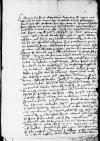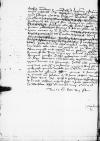Memini, cum semel colloqueremur domi tuae de negotiis orig. negociis⌈negotiisnegotiis orig. negociis⌉ meis, destinasse te mihi tempus, quo in ⌊Poloniam⌋ venirem, Pentecosten orig. Penthecosten⌈PentecostenPentecosten orig. Penthecosten⌉.[1] At nunc aegre ipsa Pentecoste orig. Penthecoste⌈PentecostePentecoste orig. Penthecoste⌉ sum hinc abiturus. Hactenus suspensa fuere negotia orig. negocia⌈negotianegotia orig. negocia⌉ mea in hac curia,[2] cum dubitaretur, quonam potissimum proficiscerer, in Scotiamne ms. Scotiam ne(!)
⌈⌊Scotiam⌋neScotiamne ms. Scotiam ne(!)
⌉, an alibi. Tandem cum ⌊Anglos⌋ paeniteat indicti belli, friguit negoti orig. negoci⌈negotinegoti orig. negoci⌉um stain⌈[um]um stain⌉ Scoticum iussusque sum me itineri Polonico accingere. Res nulla est admodum insignis, quae me movet. Nam hic vobiscum optime convenit neque intercedunt controversiae, ut admodum necesse sit illis discutiendis invigilare. Et ut intercederent, parva hic habetur ratio futuri, adeo obcaecati sunt mortalium animi. Frustra ego clamo, nisi adsit hostis, qui urgeat, quo cum sint opinione sua defuncti isti homines, parum admodum curant et sua et caesaris negotia encrypted ⌈sua et ⌊caesaris⌋[3] negotia orig. negocia⌈negotianegotia orig. negocia⌉sua et caesaris negotia encrypted ⌉.
Itaque ego nunc sum intra triduum abiturus, non via publica, namque ea latrociniis ⌊Germanorum⌋ tota patet, sed hinc in ⌊Hollandiam⌋, ex ⌊Hollandia⌋ in ostium orig. hostium⌈ostiumostium orig. hostium⌉ ⌊Wezerae⌋,[4] dehinc ⌊Bremam⌋, inde ⌊Brunswicum⌋, ex hac ⌊Magdeburgum⌋, ex ⌊Magdeburgo⌋ ⌊Lypsiam⌋, denique ⌊Vratislaviam⌋. Rationes autem huius itineris hae sunt, quod neque in Hassia quoque satis tutum sit caesareanis.[5] Viginti hominum milia ⌊Saxo⌋ ⌊Hassus⌋que in armis habent neque adhuc declaratum est, quam ad rem. Opinio est adversus ⌊Ioachimum⌋ et ⌊Moguntinensem⌋ hunc apparatum fieri, sed res omnes adhuc dubiae sunt incertaeque. Deinde non procul ab ⌊Erfurdia⌋ lustrum fit censusque, in quem ne incidam, cavendum, monent amici promiscue omnes, evitavero autem ⌊Erfurdiam⌋, si ⌊Brunswico⌋ iter fecero. Neque quicquam mihi negotii orig. negocii⌈negotiinegotii orig. negocii⌉ est alibi, alia enim omnia, quae mihi incubuerant, irrita sunt hac spe pacis conficiendae, quam sane vereor futuram ad instar orig. adinstar⌈ad instarad instar orig. adinstar⌉ aliarum.
Heri mihi relatum fuit ⌊serenissimos principes⌋ tuos concessisse ⌊Vylnam⌋ ⌊Lythuaniae⌋. Nuntius orig. Nuncius⌈NuntiusNuntius orig. Nuncius⌉ huius rei fuit Italus quidam cocus ⌊reginalis maiestatis⌋, qui in ⌊Angliam⌋ profectus est ⌊regi Anglo⌋ inserviturus et in eventum spreti servitii abiturus inde ad ⌊Gallum written over os⌈osumum written over os⌉⌋. Ait sponte se sua abiisse nolentem sequi ⌊reginalem maiestatem⌋ in ⌊Lythuaniam⌋, alii sed familiaris eius ait importunitate sua importunissimum hominem effecisse, ut eum ⌊reginalis maiestas⌋ a se dimiserit.
Quicquid id sit, satis ingens iter instare mihi satis prospicio, ibo tamen, quam citissime potero, curru vectus a ⌊Bremis⌋ ⌊Lypsiam⌋, deinde equis illic emendis utar.
 AAWO, AB, D. 3, f. 20v
Accessit commodum, quod mecum usque ad ⌊Lypsiam⌋ profecturus est amicus noster communis dominus ⌊Melchior a Germania⌋, qui te plurimum salutat.
AAWO, AB, D. 3, f. 20v
Accessit commodum, quod mecum usque ad ⌊Lypsiam⌋ profecturus est amicus noster communis dominus ⌊Melchior a Germania⌋, qui te plurimum salutat.
Oro te, ut semper me commendes illustri domino ⌊cancellario⌋ (instes, ut locus maneat in cancellaria mihi encrypted ⌈instes, ut locus maneat in cancellaria mihiinstes, ut locus maneat in cancellaria mihi encrypted ⌉). Quandoquidem, ubi primum sum rediturus ex ⌊Polonia⌋, veniam in H<i>spaniam encrypted ⌈veniam in H<i>spaniamveniam in H<i>spaniam encrypted ⌉. Quod mihi cordi esse sciebas negotium orig. negocium⌈negotiumnegotium orig. negocium⌉ quodque genitura pollicebatur hoc anno, id or pollicebatur, hoc anno id⌈pollicebatur hoc anno, idpollicebatur hoc anno, id or pollicebatur, hoc anno id⌉ fere completum est,[6] adeo omnia evenere ex animi sententia: consensit exspectatura reditum ex Polonia encrypted ⌈consensit exspectatura reditum ex ⌊Polonia⌋consensit exspectatura reditum ex Polonia encrypted ⌉ vel, si malim, ex H<i>spania encrypted ⌈ex H<i>spaniaex H<i>spania encrypted ⌉ numquam se alteri nupturam quam mihi. Hic valde timeo seditionem plebis, non novi enim, quomodo ideoque veniam ad vos encrypted ⌈nupturam quam mihi. Hic valde timeo seditionem plebis, non novi enim, quomodo ideoque veniam ad vos ms. c(!)
⌈ss ms. c(!)
⌉nupturam quam mihi. Hic valde timeo seditionem plebis, non novi enim, quomodo ideoque veniam ad vos encrypted ⌉, si non estis huc venturi encrypted ⌈estis huc venturiestis huc venturi encrypted ⌉. Scribe ad me de rebus omnibus mitteque litteras ad aulam vestram, modo intra tres menses ab hac data scribas, nam non est mihi negotium orig. negocium⌈negotiumnegotium orig. negocium⌉ diu in ⌊Polonia⌋ persistendi.
Rumor est hic ⌊Turcas⌋ maximo cum exercitu descendere in ⌊Hungariam⌋, praemissa iam esse quadraginta milia ianizerorum, sequi ducentena milia hominum cum largo commeatu. Exitus hidden by binding⌈[s]s hidden by binding⌉ apparet imminere toti ⌊Germaniae⌋. Erunt alibi quaerendae orig. querendae⌈quaerendaequaerendae orig. querendae⌉ novae terrae potius quam orig. potiusquam⌈potius quampotius quam orig. potiusquam⌉ in ea servitute moriendum. Nam quo(modo) obviare illi pesti queamus, non video hac in discordia animorum.
Commenda me plurimum illustrissimo principi domino ⌊Ioanni Alberto⌋ et concomiti nostro palatino, et domino ⌊Ioanni Anthonio Marliano⌋, et ⌊fratri tuo⌋, et ⌊tuae⌋. Queso te de Valdesio aliquid mihi scribe encrypted ⌈de ⌊Valdesio⌋ aliquid mihi scribede Valdesio aliquid mihi scribe encrypted ⌉. Et vale rectissime, amice et frater, et pater observandissime.
 AAWO, AB, D. 3, f. 20v
Accessit commodum, quod mecum usque ad
AAWO, AB, D. 3, f. 20v
Accessit commodum, quod mecum usque ad 

